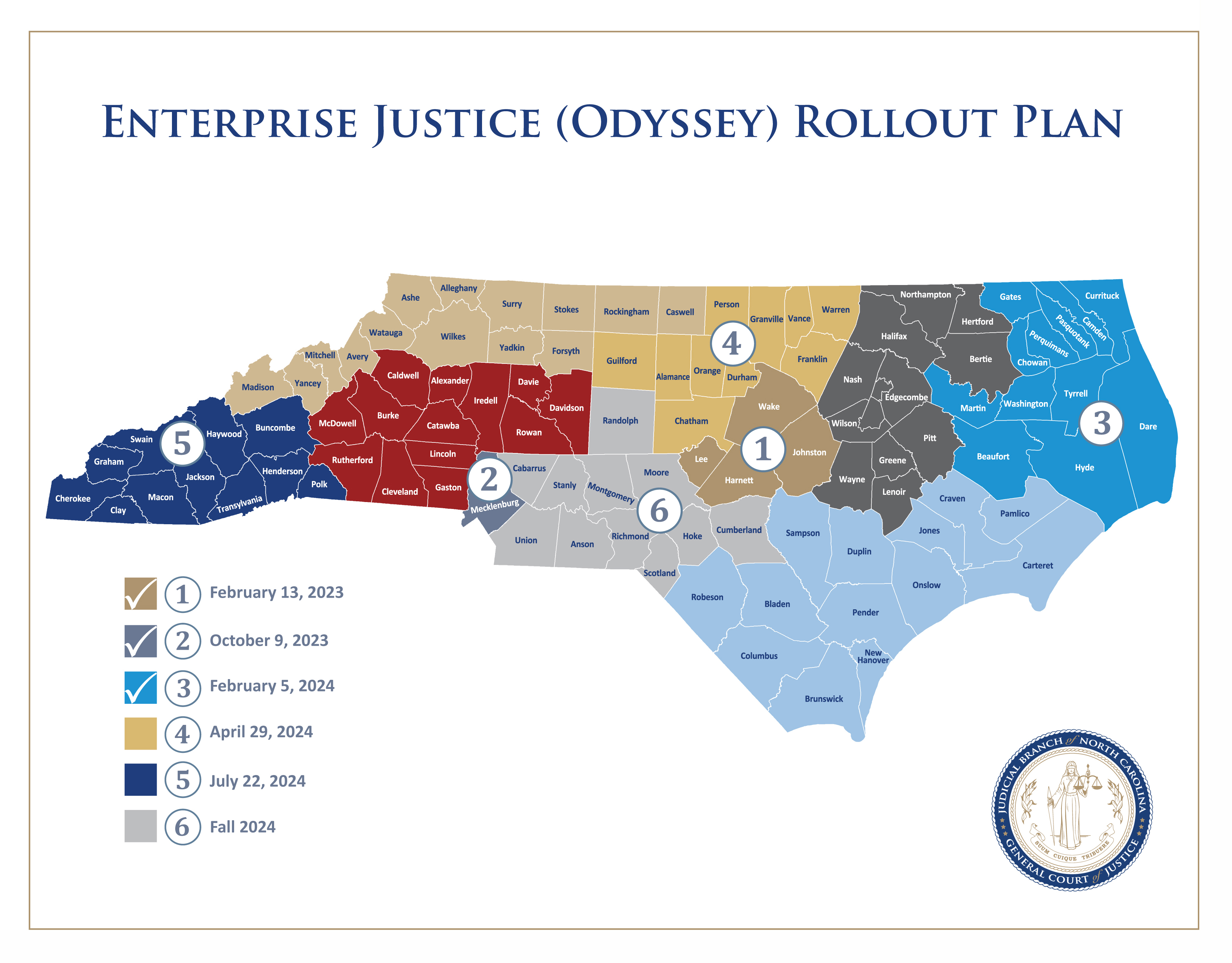eCourts Expansion in Western NC Set for July 22, 2024
Court filings will shift from paper recordkeeping to electronic access in 11 western North Carolina counties that comprise ‘Track 5’ of the eCourts implementation project starting Monday, July 22, 2024, according to the Administrative Office of the Courts (NCAOC).
The 11 counties in Track 5 of the eCourts rollout are Buncombe, Cherokee, Clay, Graham, Haywood, Henderson, Jackson, Macon, Polk, Swain, and Transylvania counties.
Currently, 17 counties from Tracks 1-3 have made the conversion from paper filings to Enterprise Justice (formerly Odyssey), a platform that provides online access to digital courthouse records. The state’s two largest counties, Wake and Mecklenburg, and it’s two smallest, Hyde and Tyrrell, are currently live on Enterprise Justice.
The Enterprise Justice system serves a mix of small, medium, and large jurisdictions, with a total population of nearly 3 million North Carolinians, and is expected to surpass 1 million electronic filings later this month.
The next county grouping scheduled to go-live, Track 4, will bring 10 additional counties from the north Piedmont/Triad region onto the digital filing system on April 29, 2024, as announced in early January 2024.
“The eCourts transition is the most important access to justice project in the history of the North Carolina court system, and the benefits to the public of replacing paper records with digital access are immense,” said NCAOC Director Ryan Boyce. “We are thankful for the hard work of court officials statewide to support this monumental transition as eCourts expands to western North Carolina this summer.”

By replacing paper processes with online access, eCourts empowers the public with electronic filing and a free online search Portal to display court records and case events. As Enterprise Justice expands statewide, millions more North Carolinians gain mobile access to their courthouse, saving time and providing transparency.
In addition to electronic filing and records searches, the eCourts suite of applications also includes the statewide eWarrants and Enforcement Mobile (Brazos) platforms, which integrate law enforcement processes with the court system. Statewide, more than 37,000 registered eWarrants users have issued 1.3 million criminal processes since the eCourts application for law enforcement replaced older systems in July 2022, while Enforcement Mobile has accepted over 2.2 million eFiled citations.
Guide & File, another eCourts tool that helps self-represented users create and electronically file common legal actions through automated interviews, has accepted 47,000 completed interviews. Tens of thousands of free, no-registration required searches for court records are conducted daily through the eCourts Portal, which also serves over 4,700 attorneys who are registered for ‘elevated access’ to their matters of record. A large network of IT and software systems teams from NCAOC supports the eCourts transition through training, on-site assistance, remote monitoring, and help desk response. Unlike many states where courts are managed locally, North Carolina’s unified Judicial Branch is taking a comprehensive approach to its digital transformation for every case type in all 100 counties, while integrating with other state and local agencies, including law enforcement.
The NCAOC estimates that more than 3.4 million sheets of paper have been saved during Tracks 1-3 of eCourts by transitioning 17 counties to electronic filing and records access over the past year.
Historically, roughly 30 million pieces of paper were added to court files each year in North Carolina. The historic transition from paper court records to digital files is also shifting data storage from obsolete mainframe technology to cloud hosting and storage, allowing NCAOC to retire outdated onsite application hosting and storage infrastructure while improving cybersecurity and online accessibility long-term.
Preparations and walkthroughs for each track of the eCourts transition begin months in advance to train court officials and the public on new technologies and processes, install improved network infrastructure in courthouses, customize programming integrations, and migrate case event data and court records from mainframe indexes and paper to a dynamic cloud-hosted platform.
Register for eCourts trainings and access education materials, screenshot reference guides, FAQs, and other resources supporting the transition, at NCcourts.gov/eCourts.
